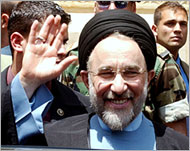Iran rejects ‘language of force’
Iran called on the United States on Monday to stop its growing pressure over the Islamic Republic’s nuclear capabilities, warning that Washington’s “language of force” would strengthen hardliners in the country.
 |
| Khatami: Those who favour dialogue will not accept pressure |
The comments coincided with a visit to Russia by Israeli Foreign Minister Silvan Shalom who is expected to raise Israeli concerns over Russia’s nuclear co-operation with Iran.
“Excessive pressure on Iran would untie the hands of those who do not believe in dialogue”, said Foreign Ministry Spokesman Hamid Reza Asefi.
“Even those who favour constructive talks would not accept the language of force and threat”, he said.
The foreign ministry spokesman’s comments come amid massive US pressure against Iran.
The United States accuses the Islamic Republic of developing nuclear weapons. Iran says its nuclear ambitions are peaceful and aim at generating electricity for its growing population.
Asefi said Western powers who voice suspicions over the programme “would do better to put pressure on their friends in the region so that they can at least become members of the NPT”, the Nuclear non-Proliferation Treaty.
Israel, the US’ staunchest ally in the Middle East, has not signed the treaty and is wdiely believed to have a large stocckpile of nuclear weapons.
Israel concerned
Israel’s foreign minister is due to hold talks with his Russian counterpart, Igor Ivanov in Moscow on Monday.
Shalom said ahead of his visit to Russia that Israel was becoming impatient with Moscow’s refusal to stop its construction of Iran’s first nuclear power plant.
Shalom told the Izvestia daily last week that Iran could develop weapons of mass destruction within three years.
“This greatly concerns Israel and, I think, should concern Russia as well”, Shalom said.
But Asefi insisted Iran was fully co-operating with the IAEA, whose inspectors are currently in the country investigating its nuclear programme.
“We have a transparent policy with regard to the agency… This visit is a sign that we wish to cooperate with the agency”, he said.
Last week, the International Atomic Energy Agency (IAEA) found that Iran had failed to comply fully with the NPT. It said, however, the Islamic Republic was taking steps to rectify the problem.
Al-Qaeda problem
The United States also accuses Iran of sheltering al-Qaeda members involved in the 12 May bombings in Riyadh, in which 35 people died including eight US citizens.
Asefi refused to confirm or deny whether Iranian authorities were able to identify a number of the network’s members held in Iranian custody.
“It is one thing to identify them, and another to discover the workings of their network and their possible plans”, he said.